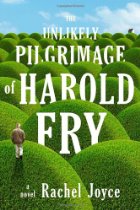 So,
after a spate of dark and heavy books, I was asking around on Twitter
one night for some what-to-read-next suggestions. One of my Twitter
friends mentioned a book she loved, The Unlikely Pilgrimage of Harold
Fry, by Rachel Joyce, which had been longlisted
for this year's Booker Prize and a galley of which happened to be
nestled in my piles of books somewhere. I'd dipped into it earlier in
the year and was interested enough to keep it around, but this
recommendation was enough to get it out of the pile and into my hands.
So,
after a spate of dark and heavy books, I was asking around on Twitter
one night for some what-to-read-next suggestions. One of my Twitter
friends mentioned a book she loved, The Unlikely Pilgrimage of Harold
Fry, by Rachel Joyce, which had been longlisted
for this year's Booker Prize and a galley of which happened to be
nestled in my piles of books somewhere. I'd dipped into it earlier in
the year and was interested enough to keep it around, but this
recommendation was enough to get it out of the pile and into my hands.I really loved it.
One day Harold Fry gets a letter in the mail from a nurse caring for his old friend Queenie Hennessey. Queenie and Harold had worked together at a brewery; Harold was an introverted salesman, a loner in a jocular, hyper masculine culture, and Queenie the lone woman. They share a secret, a secret of Harold's; a long time ago, she did him an unfathomable favor, and now, as she lay dying from cancer, Harold feels a need to see her, to thank her, to make sure she's okay, so, without really meaning to, he starts walking the many miles from his home to her bedside.
As Harold's walk progresses, Joyce tells the story of Harold and his wife Maureen, a late-middle-aged couple whose marriage has basically disintegrated. Harold is a good man but emotionally stunted by abuse and abandonment by his own parents; Maureen had expectations for her life that were different from the way things turned out. Their relationship with their son David is at the heart of their troubles as a couple, and their story is explored gradually and quietly as Harold embarks on his pilgrimage.
Joyce alternates her narrative between Harold's walk and Maureen's own, private journey at home, as she reevaluates herself, her marriage, her husband and her son. The past and the present intermingle as Harold and Maureen make their way through terrain interior and exterior. Maureen starts off in denial of what's going on; she tells her neighbor that Harold is inside. Harold likewise has no idea what he's gotten himself into and finds himself beset by injury, hunger, loneliness and cold. He tells people what he's doing as he goes and soon finds himself to be a kind of celebrity, while Maureen actually starts to miss her husband and rethink their relationship.
I found the story, which is actually quite dark, to be moving but what I really admire about the book is how tightly it's structured. Everything is a metaphor for everything else; Harold's physical journey mirrors his psychic journey, his physical injuries and lack of preparation mirror his development from childhood to adulthood. The lack of affection and direction from his parents left him unprepared for adult relationships, for parenthood, for success at work. Now that part of his life is over and he has to figure out how to face his remaining years, what remains of his marriage and his understanding of his only child. And he's hanging it all on the success or failure of the visit with Queenie.
The Unlikely Pilgrimage of Harold Fry has the potential to be a big success with lots of different kinds of readers. It's a natural fit for people who liked Major Pettigrew's Last Stand by Helen Simonson, or Natasha Solomon's Mr. Rosenblum Dreams in English but it's a good deal more melancholy than those books. A meditation on grief, on what it means to succeed or fail, and on what it means to grow up and love other people, it's a wonderful and wonderfully engrossing story of an all-too-human man and his struggle to accept himself and what life has dealt him.
Rating: BUY
FTC Disclosure: I received a review copy from the publisher.
I'm glad you loved it. :) I can understand why so many people did. It was more of a "like" to me, but I'm not a warm-fuzzies type of person I guess.
ReplyDeleteI have read so many positive reviews of the book that I have it on my list to read, one of these days....
ReplyDeleteThanks for the great review
ReplyDeleteSo many people I know and respect have loved these books but they're so far outside of my comfort zone, I can't imagine reading them.
ReplyDeleteRowena Hailey (Ptarmigan Hunts in Alaska)